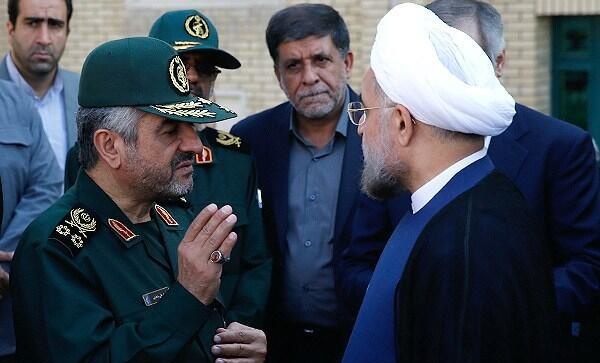Head of the Revolutionary Guards, Mohammad Ali Jafari, with President Hassan Rouhani (File)
Islamic Revolutionary Guards Corps commanders are blaming Iran’s economic problems on Iranians who voted for President Rouhani in 2013 and 2017.
In a magazine interview, the head of the Guards, Maj. Gen. Mohammad Ali Jafari, said, “It’s the people who should have made the right choice. They are the ones who need to act with watchfulness.”
Without naming Rouhani, he said Iranians had chosen Rouhani — who won a surprising first-round victory in 2013, then defeated conservative challengers in 2017 — because of his “eloquence” in debates and “defeating his rivals” in verbal exchanges.
He continued that this meant the Government had delivered nothing:
If the winner is supposed to be the good orator, then the whole system will be about words. But the candidate who is the man of real action might not be able to defeat his rivals during debates.
Deputy Commander Brig. Gen. Mohammad Reza Naqdi supported Jafari’s line:
Today’s economic condition is a fruit of the last vote. If we have any complaints about the economic hardship these days, we are the ones responsible, because we voted for those who pursued a mirage in diplomacy as a solution to the economic problems.
And Brig. Gen. Amir Ali Hajizadeh, who commands the Guards’ Aerospace Force, said, “Whenever we elected qualified officials, we did witness positive outputs. Now, to guarantee a great future for our country, we have to think twice.”
The Guards have regularly clashed with Rouhani over policies, including the President’s statements that the IRGC has too much of a stake in Iran’s economy. During the 2017 election debates, he said the Guards were trying to sabotage the 2015 nuclear deal with the testing of missiles.
The battle has grown more intense because of Iran’s economic crisis, from long-standing internal problems and US sanctions. The Supreme Leader has called for an Iranian year of “Pick-Up in Production” amid rising unemployment, a historically-weak currency, a halving of the Islamic Republic’s oil exports, and protests over working conditions and low wages.
Iran Daily, March 21: Supreme Leader — It’s “Pick-Up in Production” Year


Bastard children of mullahs blame bastard their farthers